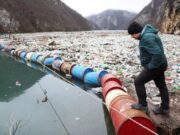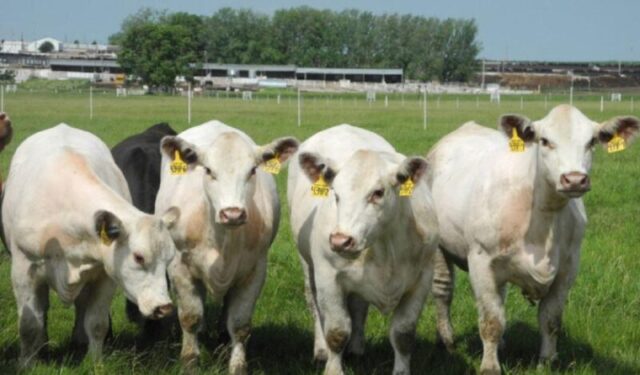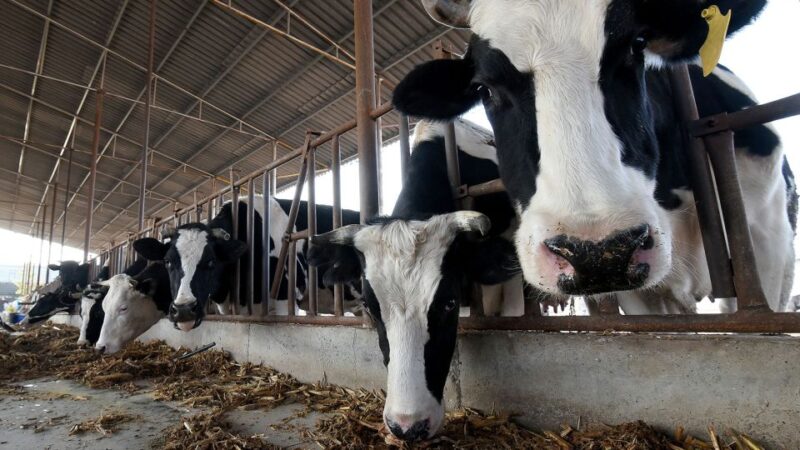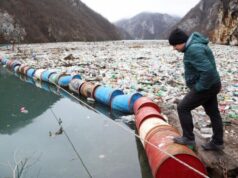Shkencëtarët kinezë kanë klonuar me sukses tre “superlopë” që mund të prodhojnë një sasi jashtëzakonisht të madhe qumështi, raportojnë mediat kineze.
Gazeta shtetërore Ningxia Daily raportoi se ekspertët nga Universiteti Veriperëndimor i Shkencës dhe Teknologjisë Bujqësore dhe Pylltarie kanë klonuar bagëtinë Holstein-Friesian me origjinë nga Holanda, raporton SE-EN.
Këto lopë mund të prodhojnë 18 ton qumësht në vit, ose 100 ton qumësht gjatë jetës së tyre; që është pothuajse 1.7 herë më shumë se sasia e qumështit të prodhuar nga një lopë mesatare në SHBA.
Siç thonë ata, kafshët e klonuara kanë lindur në fillim të këtij viti. I pari nga viçat e klonuar ka lindur më 30 dhjetor me prerje cezariane, për shkak të madhësisë së tij relativisht të madhe prej 56.7 kilogramësh.
Shkencëtarët klonuan 120 embrione nga qelizat e lopëve shumë produktive dhe i vendosën në një lopë zëvendësuese. Shkencëtari që udhëhoqi projektin, Yin Yaping, tha se klonimi i “superlopëve” ishte një hap i madh përpara pasi i lejoi Kinës të mbarështonte racat më të mira “në një mënyrë ekonomikisht të mundshme”.
“Vetëm pesë nga 10.000 lopë në Kinë mund të prodhojnë 100 ton qumësht gjatë jetës së tyre, gjë që i bën ato një burim të vlefshëm mbarështimi. Por ndonjëherë është e vështirë të përcaktohet saktësisht se cila kafshë është, gjë që e bën të vështirë rritjen e tyre. Ne planifikojmë në dy deri në tre vjet, le të krijojmë një tufë me më shumë se 1000 superlopë për të reduktuar varësinë e Kinës nga importet e lopëve”, tha Yin.
China says it successfully cloned 3 highly productive ‘super cows’
Chinese scientists have successfully cloned three “super cows” that can produce an unusually high amount of milk, state media reported, hailing it as a breakthrough for China’s dairy industry to reduce its dependence on imported breeds.
The three calves, bred by scientists from the Northwest University of Agricultural and Forestry Science and Technology, were born in the Ningxia region in the weeks leading up to the Lunar New Year on January 23, the state-run Ningxia Daily reported.
They were cloned from highly productive cows from the Holstein Friesian breed, which originated in the Netherlands. The chosen animals are capable of producing 18 tons of milk per year, or 100 tons of milk in their lifetimes.
That is nearly 1.7 times the amount of milk an average cow in the United States produced in 2021, according to the US Department of Agriculture.
The first of the cloned calves was born on December 30 by cesarean section due to its relatively large size of 56.7 kilograms (120 pounds), an official in the city of Wulin in Ningxia told the state-run Technology Daily.
The scientists made 120 cloned embryos from the ear cells of the highly productive cows and placed them in surrogate cows, according to the Technology Daily.
Jin Yaping, the project’s lead scientist, called the birth of the “super cows” a “breakthrough” that allows China to preserve the very best cows “in an economically feasible way,” the state-run newspaper Global Times reported.
Only five in 10,000 cows in China can produce 100 tons of milk in their lifetimes, making them a valuable resource for breeding. But some highly productive cows are not identified until the end of their lives, making it difficult to breed them, Jin said.
As much as 70% of China’s dairy cows are imported from overseas, according to the Global Times.
“We plan to take two to three years to build up a herd comprised of over 1,000 super cows, as a solid foundation to tackle China’s reliance on overseas dairy cows and the issue of the risk of being ‘choked’ [by supply chain disruptions],” Jin told the newspaper.
In many countries, including the United States, farmers breed clones with conventional animals to add desirable traits, such as high milk production or disease resistance, into the gene pool.
China has made significant progress in animal cloning in recent years.
Last year, a Chinese animal cloning company created the world’s first cloned Arctic wolf.
In 2017, Chinese scientists said they produced cloned cattle with increased resistance to bovine tuberculosis, a risk to cattle in many countries.


















